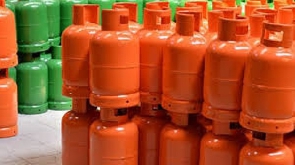The National Petroleum Authority (NPA), has said there have been numerous push and pull forces towards the deployment of the Cylinder Recirculation Model.
The NPA’s Head of Communication, Mohammed Kudus, informed Kwabena Agyapong, host of Frontline on Rainbow Radio 87.5FM, that the NPA was determined to adopt the concept despite objections.
He stated that the NPA was mindful of the opposition and had informed Ghanaians that the policy was a positive one that would protect Ghanaians’ safety.
Over the years, Ghanaians have accused the government of failing to put measures in place to safeguard the safety of petrol refill stations across the country.
Others criticised the government for failing to prevent the haphazard placement of petrol and other fuel facilities in residential neighbourhoods.
To address the issue, the government created a new Liquefied Petroleum Gas (LPG) policy with the goal of reducing explosions, maintaining stringent monitoring methods, and providing more job possibilities in the LPG retail market.
The Ministry of Energy implemented a new policy directive for the marketing and distribution of LPG in Ghana, based on the Cylinder Re-circulation Model (CRM).
The objective of the policy was to ensure that 50 per cent of Ghanaians have access to safe, clean and environmentally friendly LPG for increased domestic, commercial and industrial usage by 2030.
As part of the initiative, LPG refilling plants were to be classified into low risk and high-risk based on their deficiency in meeting safety standards in a risk assessment of all plants by the NPA.
The high-risk refilling station were to be converted into filled cylinder retail and distribution outlets, whereas low risk refilling stations would be dedicated to the supply of Autogas only, with improved safety standards, the Chief Executive Officer (CEO) of the National Petroleum Authority (NPA).
When asked about the current status of the policy, Mohammed Kudus explained that some were of the view the policy will lead to job loss and so they have opposed it but that is not that case.
“There are a lot of push factors... It is not simple. We’re committed to doing it as an Authority. However, we are mindful of the opposition. Several individuals are sceptical that we will go through with it. Some believe that once it gets going, it will pull food out of their mouth. As a result, there are push and pull factors.”
He further stated that after the bottling plants are established in various regions, the NPA will apply the policy.
There are currently two bottling plants, one in Accra and the other in the Ashanti area.
“What this means is that we are ready for a phased rollout in Accra and Kumasi.” We’re almost there. So, once I receive the signal from management, I will inform the public. We are committed to completing the programme because there are several benefits for all of us.”
About the Policy
The policy requires the LPG Marketing Companies (LMC) to ensure that the cylinders are in good condition before they are handed over to the end user.
The need to have a minimum maintenance facility to check for dents, leakages and replacement of valves etc according to the NPA is mandatory.
The maintenance would be done with the full knowledge of the LPG marketing company.
The NPA explained that there will be different sizes of cylinders to meet the needs of all income earners.
The marketing companies are expected to have different sizes of filled cylinders such as 3kg and 6kg to cater for those who would want to purchase smaller quantities.
Under the policy, consumers are expected to pay for the initial cost of the cylinder and the gas.
Subsequently, the consumers will pay for only the gas.
Business News of Wednesday, 14 June 2023
Source: rainbowradioonline.com
NPA to roll out cylinder recirculation in Accra, Kumasi despite opposition
Entertainment












